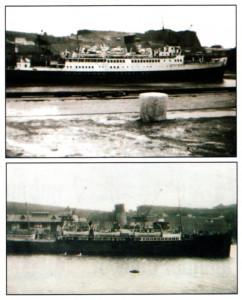
Meeting my son at Gatwick as he nonchalantly returned from a holiday in America and Canada made me realise how easy and accepted travel has become in the last 60 years. What a contrast to the holidays my family and I enjoyed in the 1930s when our trips to Jersey rated as a major travel event. We weren’t rich – just taking advantage of my father’s travel concession as a Great Western Railway employee.
The anticipation built up in the weeks beforehand, and then came the railjourney to Weymouth, where we raced excitedly along the quayside to see whether the St. Julien or St. Patrick was to be our ship for the Channel crossing. St. Julien was always the favourite as we seemed to get a smoother crossing in her, but nobody realised that in a few years’ time both vessels would be heavily involved in the conflict to come -the St. Julien at Dunkirk, then supporting the Italian invasion and finally very active at the Normandy landings, while the St. Patrick, having survived several air attacks, was finally sunk in the Irish Sea in 1941 and one of the stewardesses was awarded the George Medal for bravery. I wonder how many others recall the two ships?
We always caught the night sailing as my parents believed the excitement would help us sleep for most of the crossing, arriving first at Guernsey and then on to St. Helier harbour. The fortnight on the Island was always a great adventure, and back in the 1930s life was relatively
simple and amusement largely self-made.
The numerous beaches afforded many happy hours bathing, searching in rock pools, playing cricket, making sand castles and new friends and, above all, the exciting pastime of racing the occasional aeroplanes as they landed or took off along the firm sands of St. Helier’s beach. We soon became familiar with the shape of the Dragon Rapides as they circled the ‘landing strip’ -no radar or landing aids for the pilots in those days, just skill and experience. Sometimes we heard passengers declaring
vehemently that they had no intention of returning by air as it was too bumpy, and setting off immediately to book a sea passage for their return.
Perhaps the passing years blur the memory, but rainy days were a rarity. Littie legs were used to walking, so we walked virtually everywhere. There was little traffic and children were safe, so my parents were not worried as long as they knew where we were heading. The boating lake was a great favourite, and sending a clockwork launch from one side to the other was preferred to a yacht, which depended on the wind. One year I had a clockwork submarine which actually dived and resurfaced -perhaps an omen of what was to come. In 1938, as we crossed the Channel, we passed HMS Nelson, and I recall the cheers that went up from the passengers gathered on deck, and saying that Hitler wouldn’t dare start a war while such battleships ruled the seas.
What little pocket money we had in those days was for essentials such as ice creams or sweets, but I recall the hours of window shopping, the splendours ofjersey’s casdes, the wonderful rock pools and warnings to watch out for the tide turning, the slow-moving Jersey cows in the fields, the fantastic island scenery and perhaps finally my first (and last) cigarette, surreptitiously smoked one afternoon. My parents were certain that I was ill when I actually refused a meal that evening. Happy days.
A. F. Dibble








